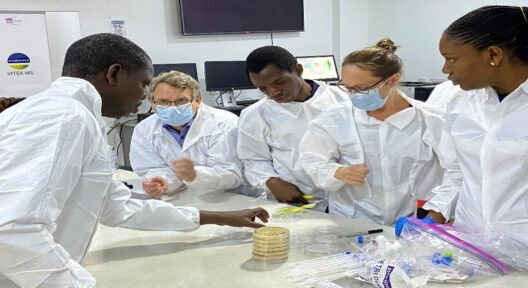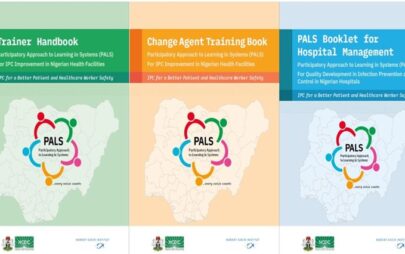NiCaDe II
Nigeria Centre for Disease Control: Capacity Development for Preparedness and Response for Infectious Diseases

Context
The strengthening of national public health institutions (NPHIs) is an essential component of global health protection. The Nigeria Centre for Disease Control and Prevention (NCDC) and Robert Koch Institute (RKI) have been working together on issues related to global health security for more than a decade. In 2019, a Memorandum of Understanding (MoU) institutionalised this collaboration. Building on previous achievements, NCDC and RKI will continue to work together on the NiCaDe II project with the aim of building further capacities in the field of global health protection. The project consists of four sub-projects in the areas of (1) hepatitis and rotavirus (HEP/RVA), (2) antimicrobial resistance (AMR), (3) infection prevention and control (IPC) and (4) research governance capacity (RGC), all of which will collectively strengthen national public health capacity in Nigeria and contribute to pandemic preparedness. The main target groups include employees at NCDC and other national health actors in Nigeria as well as health care professionals working on infectious disease diagnostics, antimicrobial stewardship and infection prevention and control.
Objective
Supporting NCDC’s mandate to prevent, detect and control infectious diseases of public health importance by strengthening Nigerian public health capacity and thereby contributing to pandemic preparedness capacity globally.
Thematic priorities
Facts
Activities
Subproject (1): HEP/RVA: Establishing intensified nationwide molecular surveillance of highly infectious viral hepatitis (B, C, E) and rotavirus gastroenteritis (RVA)
-
Training and competence development
Training of junior scientists and sentinel site teams.
-
Research and provision of evidence
Risk assessment and molecular characterisation of circulating strains to provide a scientific basis for health policy decisions.
Subproject (2): AMR: Supporting national activities to prevent and control AMR
-
Capacity development
Scaling up the innovative model diagnostic/antimicrobial stewardship approach to improve the utilisation of blood culture diagnostics in health facilities and to expand national AMR surveillance to new geopolitical zones; building the capacity of the National Reference Laboratory for AMR.
-
Research and provision of evidence
Investigating local antimicrobial use to inform policy decisions.
Subproject (3): IPC: Consolidating training capacities for IPC at the national and state levels in Nigeria
-
Training and competence development
Consolidating Nigeria’s capacity to apply the Participatory Approach to Learning in Systems (PALS).
-
Capacity development
The PALS training and practice approach supports health care workers and organisations in employing multimodal strategies for IPC improvement in the local context.
Subproject (4): RGC: Strengthening research governance at the institutional level
-
Capacity development
Assessing and improving existing – and establishing new – research governance structures to increase the ability of NCDC to undertake high-quality public health research, thereby providing improved evidence for public health decision-making.
